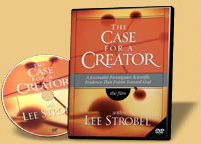
Scientists & Scholars
In The Case for a Creator journalist Lee Strobel interviews scientists and scholars who have devoted their careers to the study of evolution and intelligent design. Here you will find more information about the experts featured in the film.
Stephen C. Meyer
Stephen C. Meyer is Director of the Center for Science and Culture at Discovery Institute. Formerly a geophysicist with Atlantic Richfield Company (ARCO), Meyer earned his Ph.D. in the history and philosophy of science at Cambridge University as a Rotary International Scholar. From 1990-2002, he was on the faculty of Whitworth College. Meyer is the author of peer-reviewed publications in technical, scientific, and philosophical journals. His latest book is Signature in the Cell: DNA and the Evidence for Intelligent Design. His other books include Darwinism, Design and Public Education and Explore Evolution. Stephen Meyer’s website can be visited at www.stephencmeyer.org.
Paul Nelson
Paul Nelson is a Philosopher of Biology, specializing in evolutionary developmental biology. He earned his Ph.D. from the University of Chicago in 1998, and is presently an Adjunct Professor in the M.A. Program in Science and Religion at Biola University. Nelson has published articles in journals including Biology & Philosophy and Zygon and has contributed essays to numerous anthologies.
Michael J. Behe
Michael J. Behe is Professor of Biological Sciences at Lehigh University in Pennsylvania. He received his Ph.D. in Biochemistry from the University of Pennsylvania in 1978. Behe's current research involves delineation of design and natural selection in protein structures. In addition to publishing over 35 articles in refereed biochemical journals, he has also written editorial features in Boston Review, American Spectator, and The New York Times. His book, Darwin's Black Box discusses the implications for neo-Darwinism of what he calls "irreducibly complex" biochemical systems. The book was internationally reviewed in over one hundred publications and recently named by National Review and World magazine as one of the 100 most important books of the 20th century.
Jonathan Wells
Jonathan Wells is currently a Senior Research Biologist at the Discovery Institute. He holds two Ph.D.s; one in Molecular & Cell Biology from the University of California at Berkeley, and one in Religious Studies from Yale University. He has worked as a postdoctoral research biologist at the University of California at Berkeley and as supervisor of a medical laboratory in Fairfield, California. He also taught biology at California State University/ Hayward. Wells has published articles in numerous journals and is the author of Icons of Evolution: Why much of what we teach about evolution is wrong and The Politically-Incorrect Guide to Darwinism and Intelligent Design, and co-author of The Design of Life.
Scott Minnich
Scott Minnich holds a Ph.D. from Iowa State University and is currently Associate Professor of Microbiology at the University of Idaho. He is a Senior Fellow at the Discovery Institute's Center for Science and Culture and a fellow of the International Society for Complexity, Information and Design. Minnich is widely published in technical journals including the Journal of Bacteriology, Molecular Microbiology, the Journal of Molecular Biology, Proceedings of the National Academy of Sciences, Journal of Microbiological Method, Food Technology, and the Journal of Food Protection.
Guillermo Gonzalez
Guillermo Gonzalez is an Associate Professor of Physics at Grove City College. He received his Ph.D. in Astronomy in 1993 from the University of Washington. He has done post-doctoral work at the University of Texas/ Austin and at the University of Washington and has received fellowships, grants and awards from such institutions as NASA, the University of Washington, the Templeton Foundation, Sigma Xi (scientific research society) and the National Science Foundation.
Gonzalez has extensive experience in observing and analyzing data from ground-based observatories, including work at McDonald Observatory, Apache Point Observatory, and Cerro Tololo Interamerican Observatory. He is a world-class expert on the astrophysical requirements for habitability and habitable zones and a co-founder of the "Galactic Habitable Zone" concept, which captured the October 2001 cover story of Scientific American. Astronomers and astrobiologists around the world are pursuing research based on his work on exoplanet host stars, the Galactic Habitable Zone and red giants. In 2004 he co-authored The Privileged Planet: How Our Place in the Cosmos is Designed for Discovery with Jay W. Richards.
Jay Richards
Jay Richards is a Senior Fellow of the Discovery Institute and a contributing editor of The American at the American Enterprise Institute. He has a B.A. with majors in Political Science and Religion, an M.Div. and a Th.M., and a Ph.D. in Philosophy and Theology from Princeton Theological Seminary. Richards has written many academic articles, books, and popular essays on a wide variety of subjects. His most recent book is Money, Greed, and God: Why Capitalism Is the Solution and Not the Problem. Richards is also executive producer of several documentaries, including The Privileged Planet, based on his book The Privileged Planet with astronomer Guillermo Gonzalez.
William Lane Craig
William Lane Craig is a philosopher and Christian apologist. He currently serves as research professor at the Talbot School of Theology at Biola University. Craig earned his Ph. D. in Philosophy from the University of Birmingham in 1977 and later, in 1984, went to the University of Munich where he earned a second Ph. D., this time in Theology. He is considered to be one of the foremost Christian philosophers of the last fifty years. He has written numerous articles for the Discovery Institute’s Center for Science and Culture, of which he is a fellow. His work there relates to the philosophical and cosmological ways in which the universe is finely-tuned for life.
Robin Collins
Robin Collins is a Professor of Philosophy at Messiah College. He received his Ph. D. in Philosophy from the University of Notre Dame under Alvin Plantinga. His undergraduate work was completed at Washington State University where he studied philosophy, physics and applied mathematics. He has been interviewed for several documentaries and is currently writing a book on the anthropic principal--the idea that the universe is finely-tuned to sustain life.

